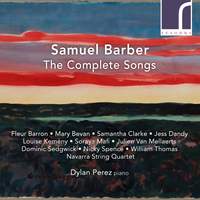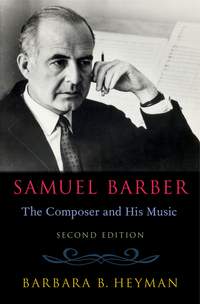Interview,
Dylan Perez on Samuel Barber
 Although works like Dover Beach, Knoxville: Summer of 1915 and the Hermit Songs have gained a firm foothold in the repertoire, it's almost thirty years since the release of the last comprehensive collection of the composer's vocal music was released (courtesy of Cheryl Studer, Thomas Hampson, John Browning and the Emerson Quartet) - what a treat, then, to welcome this new set of the complete songs from American pianist Dylan Perez and a superb line-up of singers including Mary Bevan, Fleur Barron, Jess Dandy and Nicky Spence, which also includes world premiere recordings of a number of posthumously-published songs.
Although works like Dover Beach, Knoxville: Summer of 1915 and the Hermit Songs have gained a firm foothold in the repertoire, it's almost thirty years since the release of the last comprehensive collection of the composer's vocal music was released (courtesy of Cheryl Studer, Thomas Hampson, John Browning and the Emerson Quartet) - what a treat, then, to welcome this new set of the complete songs from American pianist Dylan Perez and a superb line-up of singers including Mary Bevan, Fleur Barron, Jess Dandy and Nicky Spence, which also includes world premiere recordings of a number of posthumously-published songs.
Over video-call last month, I spoke to Dylan about why so much of this music is still relatively under-represented on record and on the concert-platform in the UK, how Barber's own vocal training and relationships with some of the great singers of the first half of the twentieth century influenced his writing, why he thinks the songs are such valuable training-tools for young singers and collaborative pianists, and the art-song competition with a difference which he's launching later this year...
Do you have any theories on why so many of Barber's songs are still comparatively little-known?
I think sometimes he just gets lost in the mix – rather like Rachmaninov, he was writing in quite an old-school style, sticking to a broadly tonal musical language rather than getting into the modernity and serialism and extended techniques that other composers were exploring at the time. But once you start delving into Barber’s music you find a lot of crunchy chords, a lot of bitonality and even atonality: it’s just that he masks it in a way that means it’s not harsh for the listener. I think the songs are wonderful, and they really do bridge the gap between art-songs and opera in a way – even the smaller ones are very dramatic in scope.
Coming from the States, I guess I’m slightly more familiar with Barber than a lot of people are over here, because we champion him a bit more. I started playing Barber songs pretty much from the beginning of my training as an accompanist: as well as just being fantastic songs, they’re a brilliant teaching-tool for collaborative pianists and singers. They teach you to follow a singer’s breath so well, and they’re also really useful in terms of singers learning how to lead and show the pianist where they want to go with a phrase.
Do you think his own background as a singer fed into that?
Definitely. Regardless of how difficult the individual songs were, each of the singers on the album agreed that they simply felt good to sing: sure, there are technical things to figure out, but nothing feels like it’s difficult for the sake of being difficult. I think Barber being a singer himself was really important to his compositional training: there so many wonderful melodies in all of his music, and to me that stems from a real understanding and love of the voice.
Were there specific singers who inspired and influenced his vocal writing?
A lot of the very early, posthumously-published songs were written for his aunt Louise Homer, a mezzo/contralto who sang pretty much everywhere in the States in the early twentieth century: although she isn’t so well known nowadays, she was quite famous during her lifetime. She premiered the songs that little Sam would write, which I thought was rather sweet. We tend to be drawn to dramatic stories about composers and artists having absolutely horrible childhoods, but that wasn’t the case with Barber: he seems to have had a really nice family life, and I think that’s lovely to see.
Later on he wrote Knoxville: Summer of 1915 (and the title-role in Vanessa) for Eleanor Steber, who had the most amazing way with text as well as a gorgeous, soaring lyric voice. The Hermit Songs were composed for Leontyne Price, as was Despite and Still and of course Antony and Cleopatra, his "failed opera". What he just loved about both of these women, I think, was not only the sheer beauty of their voices but their ability to really connect with texts and communicate them to the audience.
Even in early songs like ‘Nocturne’ and ‘Sure On This Shining Night’ he was always thinking about how he could marry the emotive quality of the text with a beautiful melody. And I think there’s a lot of Vanessa in the Mélodies passagères in terms of the sweeping vocal lines: Vanessa has these amazing long phrases that really play into verismo writing, which I think Barber was trying to emulate in a way.
Have you ever worked on a production of Vanessa as a repetiteur?
No, but I have it here on my shelf and I’d love to! I was in the States when Glyndebourne did it, but I saw the broadcast online and was really struck by how filmic the music sounded – maybe that accounts for why people don’t stage it a lot, because it’s still seen as slightly old-fashioned and somehow they don’t hear all the really cool stuff in the score. But I think that companies who champion opera in English, like English National Opera, absolutely should do the piece: that would be the most wonderful operatic experience.
It was a real surprise to hear Knoxville with a male voice and with piano – how much precedent is there for that being performed like that?
It has been done by tenors here and there, but people don’t generally associate it with a male voice, and I think that’s because it was made so famous by the Steber and Price recordings and the many fantastic sopranos who followed in their footsteps: Dawn Upshaw, Kathleen Battle, all the greats! The reason for doing it with a male voice – aside from knowing that Nicky would sing it really well! – was that James Agee and Barber were writing from a male perspective, and I thought it would be interesting to approach it from that angle.
What you hear on our recording is the composer’s own reduction – reduced slightly further by me, because as always with orchestral scores you can’t play absolutely everything! Knoxville sounds so easy and melancholic and nostalgic, but it’s actually a very difficult song. And I think it works beautifully for piano and voice, because it becomes something very personal and less grand: you do have some very small-scale, intimate moments in the orchestral version, but that’s heightened even more in the chamber setting.
You've assembled a really diverse line-up of voices for the project: how did you ‘cast’ this recording?
Obviously my husband was a No. 1 pick! The other singers are a collection of friends, colleagues and people I was just keen to work with. I wanted to have a real mix of voices on the disc, partly because it would be completely crazy to ask one person to learn all these songs! But hopefully it also keeps the listener interested in the general overview of the CD – someone new will come on every four or five songs, and I think that’s nice.
In terms of the piano writing, is there anything as technically formidable as some of the Rachmaninov songs?
It’s generally not as thick as Rachmaninov. He brings out lots of colours in the piano, and there’s a mixture of lyricism and percussive elements that generates a really nice energy throughout his music. He definitely knew his way around the instrument, and as with the vocal lines it simply feels good even when it’s difficult – I think that’s the mark of a great composer.
Did Barber have direct connections with any of the contemporary writers whose work he set?
Strong emotional connections, certainly, but not much in the way of direct contact. Barber was quite a hermit, especially when he was writing: he wasn’t that interested in getting other people’s perspectives on his music, except for the Mélodies passagères which he sent to Poulenc and Pierre Bernac to get their stamp of approval. (They loved them, and made a really interesting recording). There are a lot of James Joyce settings, and I think he was very drawn not just to Joyce himself but to Ireland in general – he liked the mysticism around it, and seemed to love finding his own way to illuminate Joyce’s thorny, almost confusing texts.
How much of his own life experiences do you see reflected in Barber's songs - in particular, was his sexuality an important facet of his identity as a song-writer?
I think he was a very, very private man. Even though it was outwardly known that he was in a relationship with Gian Carlo [Menotti], that wasn’t something that he wanted to let the world in to see, and I don’t think he wrote anything with that in mind. There’s nothing akin to Britten’s Michelangelo Sonnets, which were essentially a mass of love-letters to Pears and a means of getting away with declaring his feelings at a time when homosexuality was still illegal.
With Barber there’s always a bit of emotional distance, and I see that a lot in Despite and Still and the Hermit Songs – you can take the music at face value without really delving into it, and I think that’s partly a way of masking his personality. There’s a great biography by Barbara B. Heyman called Samuel Barber: The Composer and His Music, which is well worth investigating: he was such an interesting man.
Do you have plans to record more complete collections of songs by American composers?
I think there’s definitely a place for more American song in the UK – not that English song isn’t absolutely worth celebrating, but there are so many American composers who aren’t done at all or are only represented by one or two songs over here. A complete Ned Rorem set isn’t exactly feasible because he wrote something like 600 songs, but a selection of those and a big chunk of Dominick Argento would be fun…
What's up next for you in terms of live performances?
I’m at Wigmore Hall in July with my husband, which will be lovely: we’re doing Knoxville and Britten’s Who are these Children? as well as songs by Charles Tomlinson Griffes, Margaret Bonds and Stephen Sondheim. I’ve also got four concerts coming up as part of my little song-project Re-SUNG, which is a free concert-series based in South London, and at the end of that I’m also getting involved with an artsong competition that my friends have started in the States. It’s called songSLAM - so like a poetry slam – and the idea is that people compete in groups of three as composer, pianist and vocalist; they come up with a song of under five minutes which gets a world premiere that evening, and cash prizes are given out by the audience. It’s the first of its kind over here!
Dylan Perez (piano), Samantha Clarke, Soraya Mafi, Louise Kemény, Mary Bevan (sopranos), Fleur Barron (mezzo), Jess Dandy (contralto), Nicky Spence (tenor), Dominic Sedgewick, Julien Van Mellaerts (baritones), William Thomas (bass)
Navarra String Quartet
Available Formats: 2 CDs, MP3, FLAC, Hi-Res FLAC




